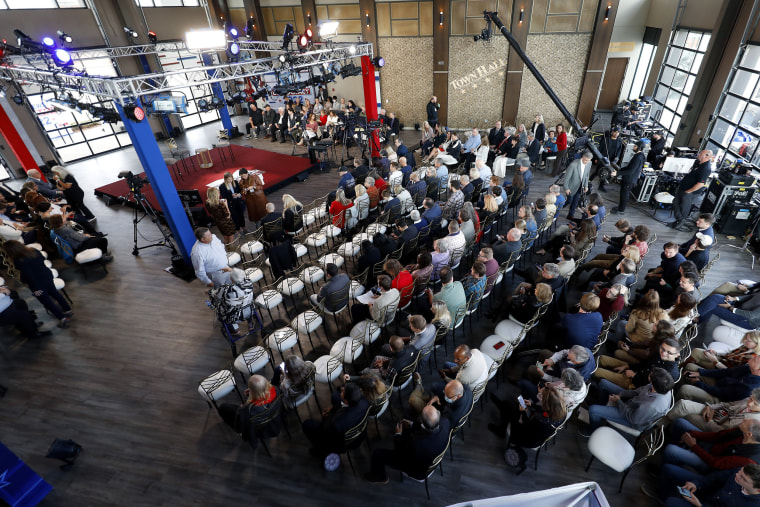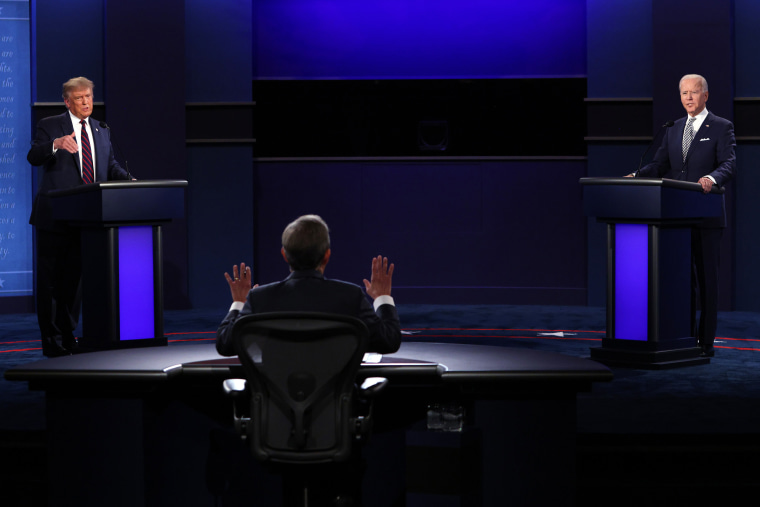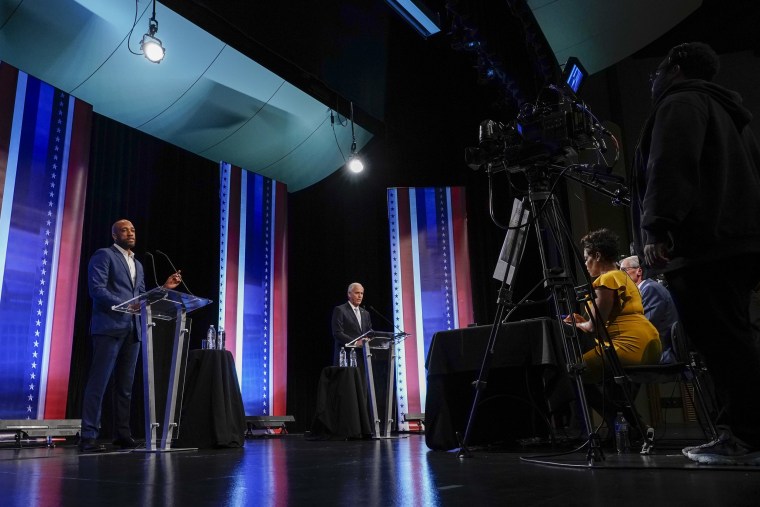WASHINGTON — The run-up to Election Day has long come with a few rites of passage for candidates, but one of them — showing up on the debate stage to take questions and square off against an opponent — seems to be fading from the list of prerequisites.
An analysis of debate schedules by NBC News confirms what many political observers have speculated: The number of debates in competitive 2022 Senate races has hit a new low since 2008.
The decline is a result of changes to the media and political landscape that have tipped the cost-benefit analysis for campaigns away from debates, strategists in both parties say, since the risk of a mistake has never been higher and the reward for participating has never been lower.
But that calculus does not factor in the cost to voters of losing one of the few remaining places where political leaders engage in unscripted political discourse and face challenging questions.
“Debates are a critical and core part of voter education, and in absence of that, we don’t have an informed electorate,” said Virginia Kase Solomón, the CEO of the League of Women Voters, a leading debate organizer for decades.
“The information derived from those debates can inform millions and millions of people,” Solomón said. "The demise of that is terrifying.”
Former President Donald Trump helped speed the trend when he showed in 2016 that a candidate could win while refusing to debate and running roughshod over traditional expectations of deference to moderators.
Other Republicans followed his lead and earlier this year, the Republican National Committee passed a resolution attempting to prohibit its 2024 presidential candidates from working with what it claims is the “biased” Commission on Presidential Debates, which has sponsored every general election presidential and vice presidential debate since 1988.
There is no public database of nonpresidential debates, so NBC News compiled a list of debates held in the 12 closest Senate races in each election from 2008 to 2020, plus the 12 races analysts expect to be most competitive in 2022.
The data shows that while the number of debates fluctuates year to year, 2022 included the fewest number of debates, only 14, in competitive Senate races — including zero in Nevada and one in Pennsylvania.
Before 2022, each election saw an average of about 20 debates among the most competitive Senate candidates surveyed. The 2012 election saw the most, with 26 debates held, while the previous low came in 2016, when there were 17 debates. Even that year had at least one debate in each of the 12 key races.
In previous years, candidates were also more likely to face off in a series of debates, while this year, no race included more than two debates. In 2020, for instance, Sen. Susan Collins, a Maine Republican, and Democratic challenger Sara Gideon debated five times in one of the most expensive races of the cycle.
Debates inform voters, but they can also sink campaigns.
History is littered with the wreckage of Senate candidates who, on debate stages, made awkward comments about the racial diversity of their staffs, seemed unaware of the contents of the First Amendment or got confused about the geography of the state to which they had only recently moved.
Campaigns tend to see debates mostly as risks, with little upside if things go well. So many have decided to opt out — especially now that it seems to be more acceptable to do so.

“More candidates are more comfortable telling the League of Women Voters to pound sand than they used to be. It’s unfortunate, but it’s a reflection of increasing partisan echo chamber media,” said Jared Leopold, a Democratic communications strategist. “More and more candidates see campaigning as running ads and talking to friendly partisan media and social media without actually engaging the other side. It’s sort of like a heavy weight boxer who only spars with people who are smaller than them.”
Leopold said he coaches candidates preparing for debates to avoid gaffes at all costs. “You can lose on points, but the knockout blow is a mistake that ends up in a TV ad,” he said.
He pointed to the recent Pennsylvania Senate debate in which John Fetterman’s stroke-affected performance was widely panned. But it was Republican Mehmet Oz’s stray comment about “local political leaders” being involved in abortion decisions that wound up as attack-ad fodder.
Debate moments that once might have been forgotten with yesterday’s newspaper can now live forever online and spread widely on social media before the debate has even finished.
For instance, far more people likely saw a picture of Georgia Republican Senate candidate Herschel Walker holding an honorary sheriff’s badge on stage than listened to a single minute of his debate with Democratic Sen. Raphael Warnock.
Meanwhile, candidates no longer feel obligated to the local media outlets that typically sponsor debates, since they have plenty of other ways to connect with voters.
“There’s less of a reliance on the press to get candidates’ messages out,” said Matt Gorman, a longtime Republican communications strategist. “They can reach people through either friendly media or owned media, such as social networks.”
This reliance on social media only heightens as distrust of mainstream media outlets grows.
“Not engaging in debates in mainstream media doesn’t reflect poorly on the candidate because their supporters don’t really support those outlets anyway,” said Megan Goldberg, a political scientist at Cornell College who has studied debates.
The new reality has shifted the power balance in favor of the candidates and away from organizers.
Robert Boatright, research director at the National Institute for Civil Discourse, has been involved in organizing debates in Arizona. He said candidates now make impossible demands, like being told the questions in advance, to secure their participation.
Before the recent rash of candidates refusing to debate, politicians “negotiated with [organizers] over things like what kind of lectern will there be, what kind of format will there be, but candidates couldn’t necessarily threaten to walk away," he said.
Trump also showed that many voters are not interested in substantive policy dialog or bipartisan civility, and just want to see their candidate crush their opponents and even the moderators.

“The thing that makes you tune in to debates is the same thing that makes you tune in to a football game, and it’s to cheer for your team,” said Goldberg. “You’re not going in trying to learn about the candidates. You’re there to see your candidate win.”
Some wonder if debates are even still worthwhile in an age when they hardly resemble sober policy discussions.
“I can’t say I’m particularly a fan of debates, I think that of late, they’re more opportunities for the candidates to see who can best get on his or her talking points,” said University of Iowa political scientist Tim Hagle. “Are we as voters still getting information that we want from our candidates?”
Still, debates may be the last place voters can get a sense of how candidates perform under pressure and being on their toes, answering questions they might otherwise avoid.
Frank Fahrenkopf, a former RNC chairman and the current co-chair of the Commission on Presidential Debates, said debates still show voters a side of candidates they can't see anywhere else — but that it's up to Americans to make candidates come to the stage.
"There’s no way you can force a candidate to debate. It really has to come from public pressure," he said.
Fahrenkopf said plenty of past presidents have tried to get out of debating, but ultimately relented to the pressure. He expects that public expectation will carry the day for the presidential candidates in 2024, no matter what the RNC does and even if the public has been more forgiving of lower-level candidates who skip debates.
“They’re free to do as they please, but we’re proceeding as normal,” Fahrenkopf said, referring to the RNC. “My sense is the nominee of the two parties will be agreeing to debate.”

